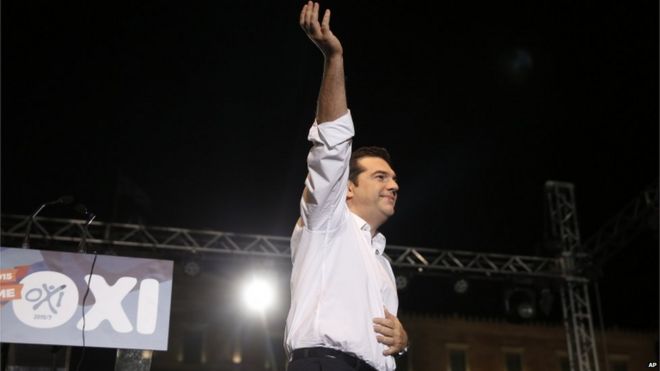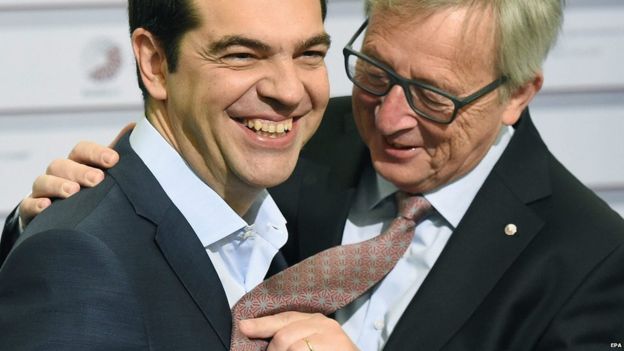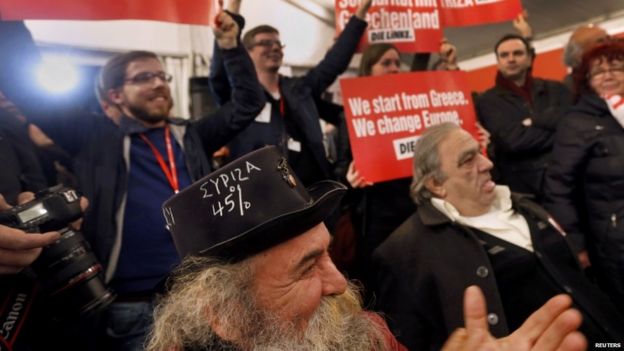Leader who risked Greece's euro future
Alexis Tsipras: Leader who risked Greece's euro future
- 21 August 2015
- Europe

Shortly after being elected prime minister of Greece, Alexis Tsipras received a silk tie from his Italian counterpart, Matteo Renzi.
The left-wing Greek leader, known for his informal attire, promised to wear the gift once his country's debt crisis had been resolved.
That tie is yet to appear around the neck of the youngest political leader in modern Greek history, who has forged an international reputation on challenging the EU policy of austerity.
And it is likely to remain in the drawer for while longer after he announced he was resigning as prime minister on 20 August, to seek re-election.
The Syriza leader said he had a moral duty to go to a vote after signing up to fresh austerity measures as part of a third bailout for Greece.
Alexis Tsipras was elected prime minister, aged 40, in January 2015 - six years after becoming the leader of Syriza, a group of radical left-wing parties. He was instrumental in transforming the coalition from an also-ran to a ruling party.
At his swearing-in ceremony, Mr Tsipras broke with tradition by refusing to take a religious oath, saying it was against his atheist principles. After the election, he continued to zip around Athens on a motorbike, as he had done before.
His first gesture as prime minister was a visit to a monument honouring Greek communists executed by Nazi occupation forces in 1944.
For a man whose political life began as a communist, the visit was heavy with symbolism, also because Germany holds more Greek debt than any other eurozone state and Greece is still seeking reparations for the Nazi occupation.
Month after month, he defied international creditors and tested the patience of his European partners.
Then, late on 26 June, as Greek negotiators were locked in talks with their European partners, he summoned them out of the room by text message.
Mr Tsipras told them he was calling a referendum on a deal that was not even on the table. In a late-night TV address, he spoke of the bailout as "unbearable" and a "humiliation".
It came out of the blue and was viewed either as a reckless gamble or a masterstroke, casting into doubt Greece's future in the euro.
Cash support for Greek banks was frozen, and the government imposed capital controls, shutting the banks and limiting cash withdrawals.
Opponents questioned whether he had ever really wanted to stay in the eurozone, and EU leaders were infuriated by his decision.
But when Greeks surprised the pollsters and backed their prime minister's stance, he told them their mandate was not "rupture with Europe" but a mandate for a viable solution.
As Greece's economy teetered on the brink of leaving the euro, Mr Tsipras agreed a deal for a third bailout that many of his colleagues refused to back, and even he admitted he did not believe in it.
"I acknowledge the fiscal measures are harsh, that they won't benefit the Greek economy, but I'm forced to accept them," he told MPs.
He called a fresh vote amid a rebellion by some Syriza MPs, who then split to form a new party.

Alexis Tsipras's political origins are far removed from the large parties and dynasties that have traditionally governed Greece.
He was born in Athens, three days after the fall of the Greek military junta in 1974 - a time of deep political division.
However, the Tsipras family was not regarded as especially political. Sport may have been a stronger draw for the young Alexis, who grew up near Panathinaikos football club's stadium, and remains a fan of the team.
Alexis Tsipras was not schooled at the usual private schools that most politicians in Greece with a pedigree prefer, but graduated from a state school in Ampelokipoi, a middle-class area in central Athens.
It was where his political activism began, leading a student protest against the right-wing government's education policy.
Matthew Tsimitakis, an activist who was then a pupil at another Athens school, described meeting the young leader, in a 2012 profile broadcast on BBC Radio.
"He struck me as very intelligent, calm, passionate but also very aware - he could represent the balance of a few hundred thousand kids who weren't very sure of what they were demonstrating about."

It was at school that he met Peristera "Betty" Baziana, who was to become his wife. They were both active in the Communist Party of Greece's youth wing and shared the same world view.
They went to university in different cities and later chose a civil wedding instead of a traditional religious ceremony.
The couple now live in the middle-class Athens neighbourhood of Kypseli, and have two young sons - Pavlos and Orpheas Ernesto (after Ernesto "Che" Guevara).
Although Ms Baziana has rarely appeared in public, she reputedly threatened to leave him if he gave too much ground to Greece's international creditors.

Like his father, Mr Tsipras's career began in civil engineering but in 2006, he represented Syriza in the Athens mayoral election.
"He toured around neighbourhoods in Athens, and tried to have close contact with potential voters," Elpida Ziouva, a civil servant for the Athens assembly, told the BBC.
What was not clear from his early political career was how far he was prepared to go to rid his country of austerity, by closing the banks and bringing Greece to the verge of exit from the eurozone.
Comments